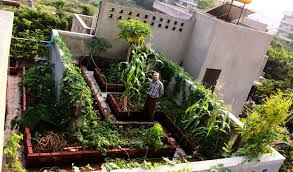Mahatma Gandhi’s famous quote “Be the change you that you wish to see in the world” is quite relevant in today’s world when there are so many issues across the globe that need our attention. Climate change and global warming is one such concern. Governments, businesses and the civil society together need to take action to bring about change. In order to understand what we as individuals can do to be agents for change, we need to look at our own lives and how we can make significant changes to be more sustainable as individuals. We need to take small actions and change the way we live, travel, eat, consume.
The best place to start is by calculating our own personal ecological or carbon footprint. There are numerous calculators now available for free online, some are very basic, and others extremely sophisticated. I will suggest the calculator provided online by Redefining Progress on http://myfootprint.org/. Your ecological footprint is presented in terms of the number of ‘Earths’ that would be required to sustain your lifestyle if everyone else on the planet lived in the same way. It is a very interesting find. I was happy to know that my kind of lifestyle would require about half Earth. It’s really an eye-opener and you must certainly check this.
What is Ecological footprint
Your ecological footprint is calculated in Global Hectares. A global hectare quantifies the biocapacity of the Earth. One global hectare measures the average productivity of all biologically productive areas (measured in hectares) on Earth in a given year.
The results of your ecological footprint are also broken down into individual domains, namely:
- carbon footprint
- food footprint
- housing footprint
- goods and services footprint
Each of these in turn is compared with the national average for the country you live in to help you understand how your lifestyle compares with that of others.
Reducing ecological footprint
The most effective action an individual can take involves changing energy use associated with transportation and in the home. These two areas constitute most of our energy use and also have maximum scope for reduction.
Our choice of transport has a significant impact on our footprint. On average, we can reduce our total ecological footprint by as much as 20% if we don’t own a car. Obviously, using it less will reduce our footprints. Alternatives such as walking, cycling, or taking public transport will help reduce congestion and carbon dioxide emissions and will also reduce your overall footprint.

Aviation has the fastest growing carbon emissions of any industry sector. Flying has an even greater impact on climate change than we previously thought. Flying has two to four times the impact of carbon dioxide emissions on climate change because it releases water vapour and nitrous oxides at high altitude. So flights, as you could imagine, cause a large and growing part of our collective footprint– for example, a single passenger’s share of a return flight from London to New York has nearly four times greater impact on the climate than the average person in India has in an entire year.
So what about in the home? Firstly, turn to energy efficient appliances at home and always look for the BEE rating before buying new appliances. For the easiest way to make your existing home energy efficient is to ensure that any cavity walls and your roof are well-insulated. Improving a home’s installation, which could be a quick and easy option, will normally repay the cost and reduce energy bills within a few years. There are many other simple measures that not only reduce your footprint but also save you money– for example, turning your appliances off instead of switching them to standby.
Ever thought about growing your own fruit and vegetables? Well, that would reduce all the energy and waste which normally goes into getting food from field to our plates through transport, refrigeration, and packaging. If you haven’t got a big garden, you can grow herbs in your kitchen window. And if you’ve green fingers, you could rent an allotment or share an allotment with friends. Similarly, buying locally grown seasonal food means we can reduce our food miles and use less packaging to preserve fresh produce. Food that’s been transported halfway around the world can never have a small footprint although its impact can sometimes be lower than intensively-produced local food.

Organic and other forms of low-input farming use minimal or no pesticides and fertilizers. And this is good because these are energy-intensive in their manufacture. And they support high levels of biodiversity on farms. Organic and other more holistic farming approaches tend to prioritize animal welfare, too, much more than conventional methods do.
Finally, the ecological footprint of a vegetarian can be 40% lower than those consuming a low meat diet. So if you can’t stand the thought of becoming a vegetarian, you could maybe consider having at least one meat-free day a week.
Now talking about recycling. Instead of buying new things, we can buy secondhand or borrow. On average, 10% of an individual’s footprint is made up of the things they buy. We should look at recycling everything we can. There are simple things we can do, like avoiding over-packaged products when shopping and donating unwanted items to charity shops.

So I’ve highlighted only a few of the many things that we could do to live more sustainably. Some of the lifestyle changes described may seem relatively easy to implement while some challenging at this time. We have to remember that even making one simple change will have an impact on our footprint.
So while making changes to your lifestyle can reduce the size of your individual footprint, the changes you make can also inspire others as well as help society build sustainable ways of living for all. To achieve sustainability, we have to ask difficult questions about how we want to live and use the resources of this planet. Answering these questions as a society means sharing our concerns. So why not encourage people you know to find out there ecological footprint and to show them how they, too, can reduce their impact on the planet!

Leave a Reply